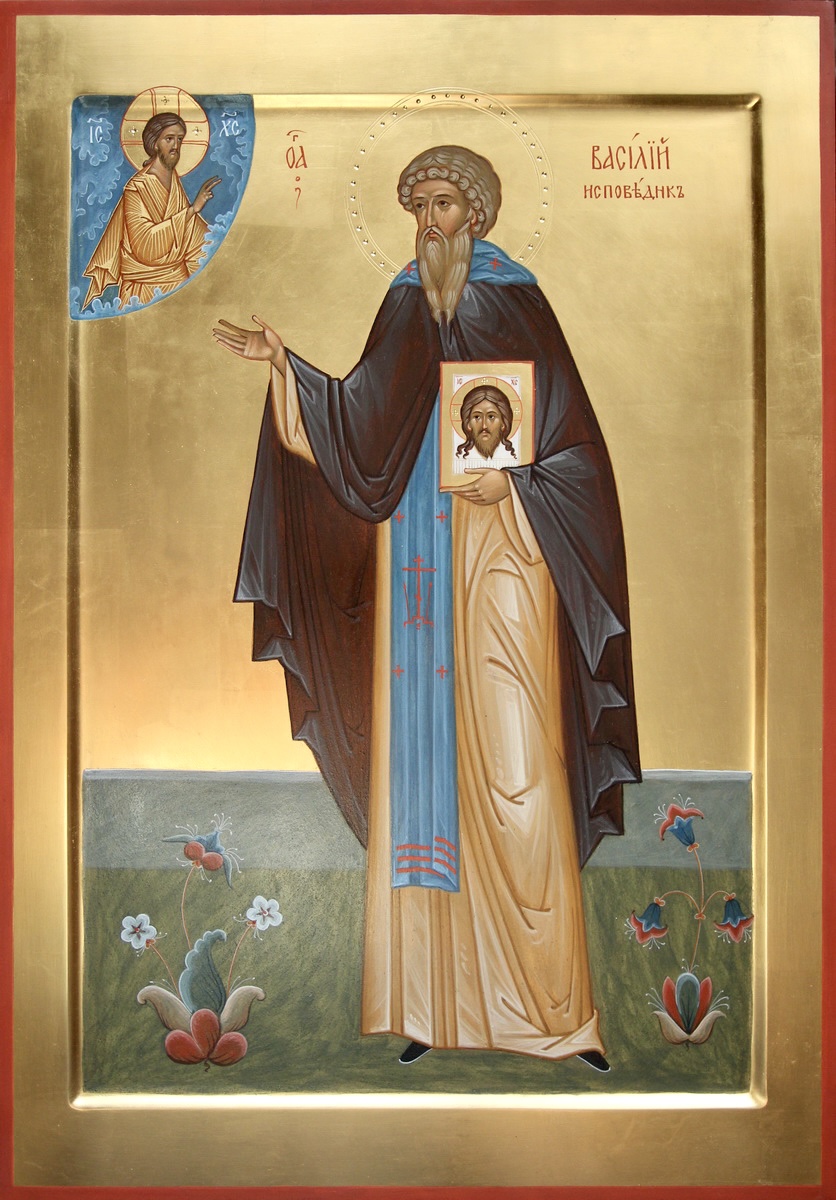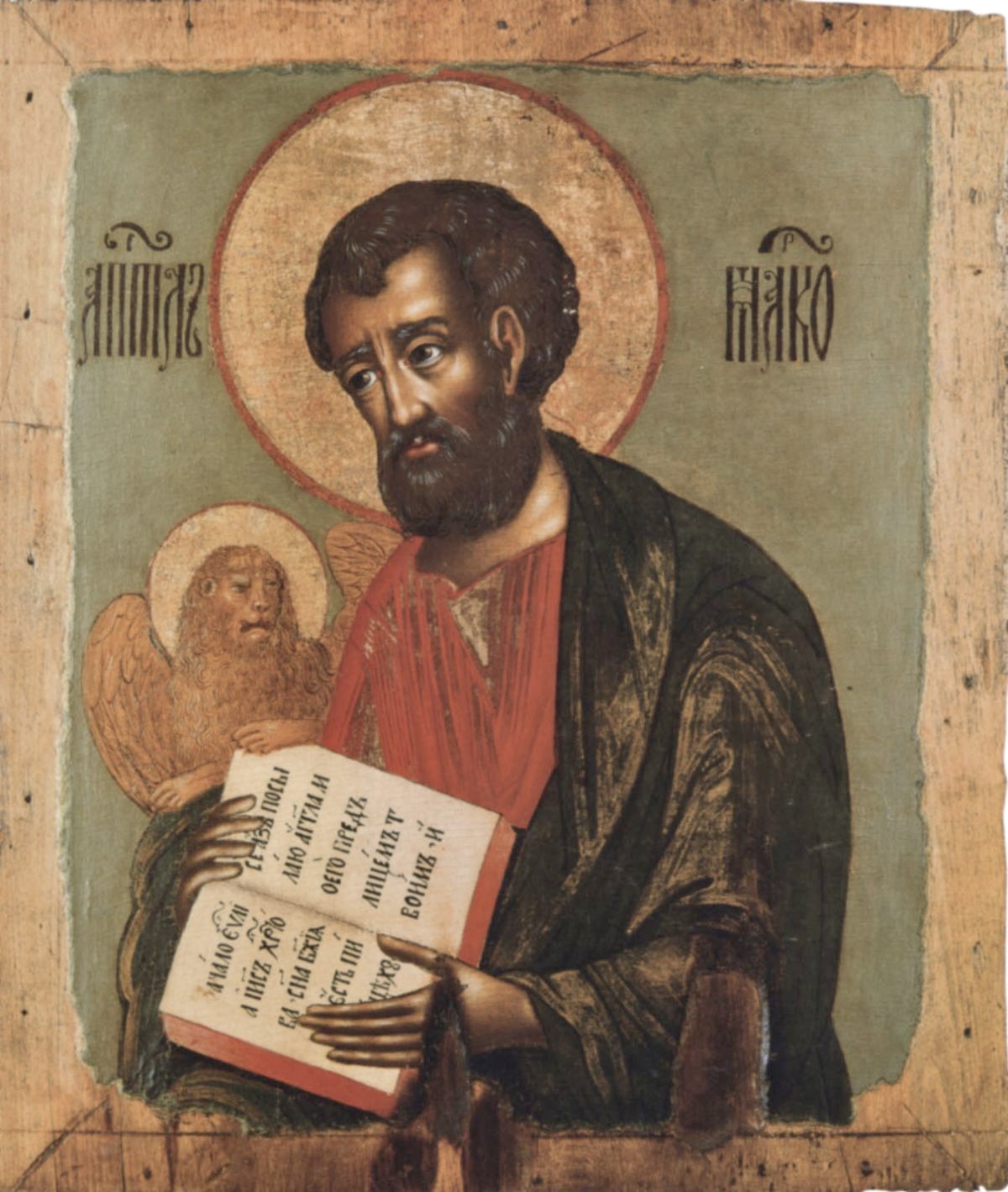
Ode I, Irmos: Thy victorious right arm, * in a manner befitting God, * hath been glorified in strength, O Immortal One; * for in its infinite strength it shattered the enemy, * fashioning anew a path for the Israelites through the deep.
Holy, glorious, all-praised, Apostle and Evangelist, Mark, pray to God for us.
O blessed one, who like a skilful fisherman hast drawn men forth from the deep of transgressions with thy net, illumine my soul with radiant splendours, and grant that I may praise thy memory as is meet, O divinely revealed evangelist Mark.
Holy, glorious, all-praised, Apostle and Evangelist, Mark, pray to God for us.
The pre-eternal and supremely perfect God, Who with the Father is equally beginningless, appeared on earth incarnate as a man, and showed thee forth, O blessed one, as His fellow-labourer in grace and His most wise servant, who art strengthened by His power.
Glory be to the Father, and to the Son, and to the Holy Spirit.
Thou wast a disciple of the most wise Peter, and was greatly enriched thereby, O all-glorious Mark, showing thyself to be an initiate of the divine mysteries, and one who followed in his glorious footsteps.
Now and ever, and unto the ages of ages. Amen.
The Angel of Great Counsel, having assumed flesh, manifested Himself to the world through the Virgin Mother, and showed thee forth, O father Mark, as a disciple adorned with virtues, a divine herald proclaiming His words.
Ode III, Irmos: Thou alone knowest the weakness of human nature * and in compassion hast assumed its form; * do Thou gird me with power from on high, * that I may cry unto Thee: * Holy is the animate temple of Thine ineffable glory, O Lover of mankind!
Holy, glorious, all-praised, Apostle and Evangelist, Mark, pray to God for us.
Thy friend Mark, O Christ, proclaiming Thee, the hypostatic Wisdom, hath thereby enlightened the whole world O Lord, with thine abundantly splendid rays, O Lover of mankind.
Holy, glorious, all-praised, Apostle and Evangelist, Mark, pray to God for us.
O Christ, Who lovest mankind, Thine eyewitness Mark, having received an ever- flowing stream of wisdom resounding like a river, hath watered the ends of the earth with the light of divine knowledge, truly revealing Thy prophecy.
Glory be to the Father, and to the Son, and to the Holy Spirit.
Manifestly following Peter, O wise one, as his disciple thou didst copy the Gospel, receiving from him the light of theology and clearly proclaiming the coming of God in the flesh, O apostle.
Now and ever, and unto the ages of ages. Amen.
Thou didst cause the temples of the demons to quake, O Thou Who wast aforetime borne to Egypt in the Virgin’s arms, and thither Thou didst send Mark, that all might know of Thy divine mystery and that Thou hadst become man.
Lord, have mercy. Lord, have mercy. Lord, have mercy.
Sessional Hymn of the evangelist, in Tone I: Spec. Mel.: “Thy tomb, O Saviour …”: Having ascended to the summit of virtue, O divine Mark, as a godly preacher thou hast thundered down upon us the great mysteries of the dogmas of salvation. Wherefore in faith we entreat thee, O most blessed one; free us from every sorrow, offence and misfortune.
Glory be to the Father, and to the Son, and to the Holy Spirit; now and ever, and unto the ages of ages. Amen.
Seedless was thy conception, and transcending understanding was thy childbirth, O immaculate Virgin Mother; an awesome deed, an exceeding great wonder, honoured by the angels and glorified by mortal men, O Lady and Maiden.
Ode IV, Irmos: Perceiving thee with prophetic eyes * as the mountain overshadowed by the grace of God, * Habbakuk proclaimed that the Holy One of Israel * would come forth from thee, * for our salvation and restoration.
Holy, glorious, all-praised, Apostle and Evangelist, Mark, pray to God for us.
Thy sound hath gone forth into all the earth, O most wise one, and the power of thy words manifestly extendeth to the ends of the world, like David splendidly preaching our salvation and renewal.
Holy, glorious, all-praised, Apostle and Evangelist, Mark, pray to God for us.
Like lightning Thy most wise apostle hath appeared to the world, O Saviour, announcing the joy of truth, illumined with the divine radiance of effulgence, unto our salvation and renewal.
Glory be to the Father, and to the Son, and to the Holy Spirit.
Thy feet were adorned prophetically, for ineffably hast thou announced unto us the Peace that hath manifestly revealed Himself in the flesh to the ends of the world, unto our salvation and renewal.
Now and ever, and unto the ages of ages. Amen.
The Word sat upon the cloud of the Virgin and, in that He is merciful, He made foolish the counsels of Egypt and hath destroyed thoughts adverse to God through the teachings of the divine Mark, unto our salvation and renewal.
Ode V, Irmos: Thou hast shone upon us with the radiance * of Thy coming O Christ, * and illumined the ends of the world with Thy Cross, * enlighten with the light of thine understanding * the hearts of those who with right worship hymn Thee.
Holy, glorious, all-praised, Apostle and Evangelist, Mark, pray to God for us.
Thou didst let fall the sweetness of piety, the shower of thy divine words, casting light over all in bright beams, clearly revealed by the grace of the noetic Sun, O all-blessed and God-pleasing Mark.
Holy, glorious, all-praised, Apostle and Evangelist, Mark, pray to God for us.
From the house of the Lord thou didst pour forth a wellspring watering barren hearts abundantly with spiritual streams, teaching them to bring forth fruit instead of barrenness, O apostle.
Glory be to the Father, and to the Son, and to the Holy Spirit.
Thou wast the son of the great Peter, and illumined by his teaching thou didst enlighten the souls who approached thee fervently, O blessed apostle, seer of God.
Now and ever, and unto the ages of ages. Amen.
O Christ Who shone forth from the Father before all creation, and wast born of the Virgin as a man, Thou wast sent to the Egyptians. For them, O Wise One, Thou didst anoint Mark who hath taught them the mysteries of divine knowledge.
Ode VI, Irmos: The deepest abyss hath surrounded us, * and there is none to deliver us, * yea we have been counted as sheep for the slaughter; * save Thy people O our God, * for thou art the strength and restoration of the weak.
Holy, glorious, all-praised, Apostle and Evangelist, Mark, pray to God for us.
Thou didst set at naught the scorn of the wicked, O Lord, and didst put down their prideful arrogance, showing forth Thine apostle as a conqueror by Thy might, for Thou art the strength and restoration of the afflicted.
Holy, glorious, all-praised, Apostle and Evangelist, Mark, pray to God for us.
By thy words, O wise Mark, thou didst preach the Fashioner of creation, the Crown of hope wherewith we are now crowned, and which, to our glory, hath been wrought of the nature of the flesh.
Glory be to the Father, and to the Son, and to the Holy Spirit.
O glorious one, the pre-eminent Peter clearly instructed thee to mystically record the precious Gospel, showing thee to be a servant of divine grace, for thou didst shed the light of divine knowledge upon us.
Now and ever, and unto the ages of ages. Amen.
Through the Virgin Mother of God didst Thou enlighten Egypt which aforetime was in darkness, entering it as an infant, O Lord; and Thou didst reprove its vanity through the teachings pf the divinely eloquent Mark, O Thou Who lovest mankind.
Lord, have mercy. Lord, have mercy. Lord, have mercy.
Glory be to the Father, and to the Son, and to the Holy Spirit; now and ever, and unto the ages of ages. Amen.
Kontakion, in Tone II: Spec. Mel.: “Seeking the highest …”: Receiving from on high the grace of the Spirit, * thou didst destroy the snares of the orators, O apostle, * and, hunting all the nations, * thou didst lead them to thy Master, O all-glorious Mark, ** preaching the divine Gospel.
Ikos: A disciple of the pre-eminent apostle, with him thou didst preach Christ the Son of God, rendering steadfast upon the rock of truth those who were shaken by falsehood. Do thou also make me steadfast thereon, and set aright my steps, that, delivered from the snares of the enemy, I may glorify thee without faltering, for thou hast enlightened all, O wise Mark, preaching the divine Gospel.
Ode VII, Irmos: We the faithful perceive thee, O Theotokos, * to be a noetic furnace; * for as He, the supremely exalted One, * saved the three children, * so hath He wholly refashioned fallen humanity, in thy womb, * O Thou praised and supremely glorified God of our fathers.
Holy, glorious, all-praised, Apostle and Evangelist, Mark, pray to God for us.
Illumined with divine rays, thou dost mystically, by reflection, emit radiant beams, O most blessed Mark, for thou didst preach the Word incarnate, the Timeless One, the praised and supremely glorious God of our fathers.
Holy, glorious, all-praised, Apostle and Evangelist, Mark, pray to God for us.
O Maker of all, having armed thy divinely eloquent disciple with divinely effective power, Thou didst make of him a wonderworker, for he hath dispelled affliction and healed wounds, preaching Thee, the supremely praised and supremely glorious God.
Glory be to the Father, and to the Son, and to the Holy Spirit.
Having as teacher the divine Peter, the first in rank among the choir of the apostles, thou didst show thyself to be like unto him, for thou didst bring order to all the fullness of the Church of the supremely praised and supremely glorious God of our fathers.
Now and ever, and unto the ages of ages. Amen.
Following the saying of Isaiah, O most glorious one, thou didst thyself set up a pillar in Egypt: the scripture of thy Gospel, for Him Who, without seed, was born of the Mother of God, proclaiming our supremely praised and supremely glorious God.
Ode VIII, Irmos: In the furnace as in a fiery smelter * the Israelite children shone more brightly than gold * with the beauty of godliness, * as they exclaimed: Bless the Lord all ye works of the Lord, * hymn and supremely exalt Him throughout all ages.
Holy, glorious, all-praised, Apostle and Evangelist, Mark, pray to God for us.
Christ, the Word begotten of the Father before all ages, Who clothed Himself in human nature, didst thou preach, O glorious one; and thou didst cry aloud: O all ye works of the Lord, hymn and supremely exalt the Lord throughout all ages!
Holy, glorious, all-praised, Apostle and Evangelist, Mark, pray to God for us.
O glorious one, thou didst glorify Christ Who gaveth Himself as deliverance from our offence and passion and raised up the fallen; and thou didst cry: O all ye works of the Lord, hymn and supremely exalt the Lord throughout all ages!
Glory be to the Father, and to the Son, and to the Holy Spirit.
Submitting to the most wise teaching of Peter, O Mark, thou didst most wisely commit to writing the precious Gospel for the faithful who cry aloud: O all ye works of the Lord, hymn and supremely exalt the Lord throughout all ages!
Now and ever, and unto the ages of ages. Amen.
Bearing Emmanuel as an infant, the Virgin stood before the Egyptians, to whom Mark is set like a radiant star, crying aloud: O all ye works of the Lord, hymn and supremely exalt the Lord throughout all ages!
Ode IX, Irmos: The Bush, which burnt without being consumed, * prefigured thy pure birthgiving, O Theotokos. * Wherefore, we now entreat Thee: * quench the raging furnace of temptations that beset us, * that we may unceasingly magnify Thee.
Holy, glorious, all-praised, Apostle and Evangelist, Mark, pray to God for us.
Having reached the ineffable wellspring of the three-sunned radiance O divinely revealed one, and most manifestly delighting in the divinity therein, which is beyond the mind of mortals, thou dost now unceasingly rejoice with the angels O most blessed one.
Holy, glorious, all-praised, Apostle and Evangelist, Mark, pray to God for us.
As one who was familiar with the teachings of Peter, and his godly preaching, thou dwellest now in the heavenly mansions with him, O most blessed and godly-spoken one, do thou pray for us O apostle Mark.
Glory be to the Father, and to the Son, and to the Holy Spirit.
The Light, thrice-radiantly joined and strangely unified, didst thou piously preach, a right worthy one, illumined by a ray of grace. Wherefore, we entreat thee: Ever offer supplication on our behalf.
Now and ever, and unto the ages of ages. Amen.
The honoured apostle Mark was given as a holy hierarch to the Egyptians, to whom the Lord of glory had also come, incarnate as a babe through the pure Virgin Mother of God; and Him do we magnify as is meet.

Troparion, in Tone III: O holy apostle and evangelist Mark, * entreat the Merciful God * that He grant remission of sins ** unto our souls.
Another Troparion, same tone: Thou wast an apostle of Christ who learned from the pre-eminent Peter, * and didst shine like the sun upon the lands of the Alexandrians, * being their adornment. * Through thee was Egypt freed from deception, O blessed one, * who as the Church’s pillar of fire dost illumine all with thy teaching of the Gospel. * Wherefore, honouring thy memory, we keep splendid festival, ** O divinely eloquent Mark, entreat God, that He grant unto our souls, remission of sins.
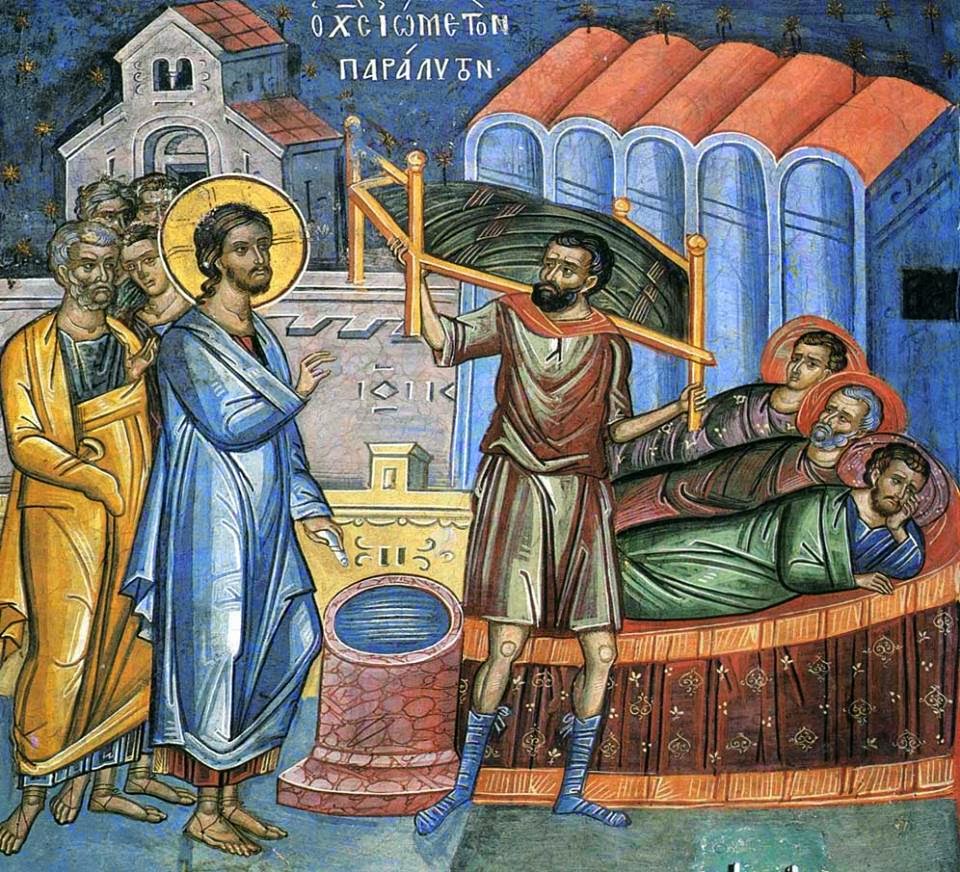
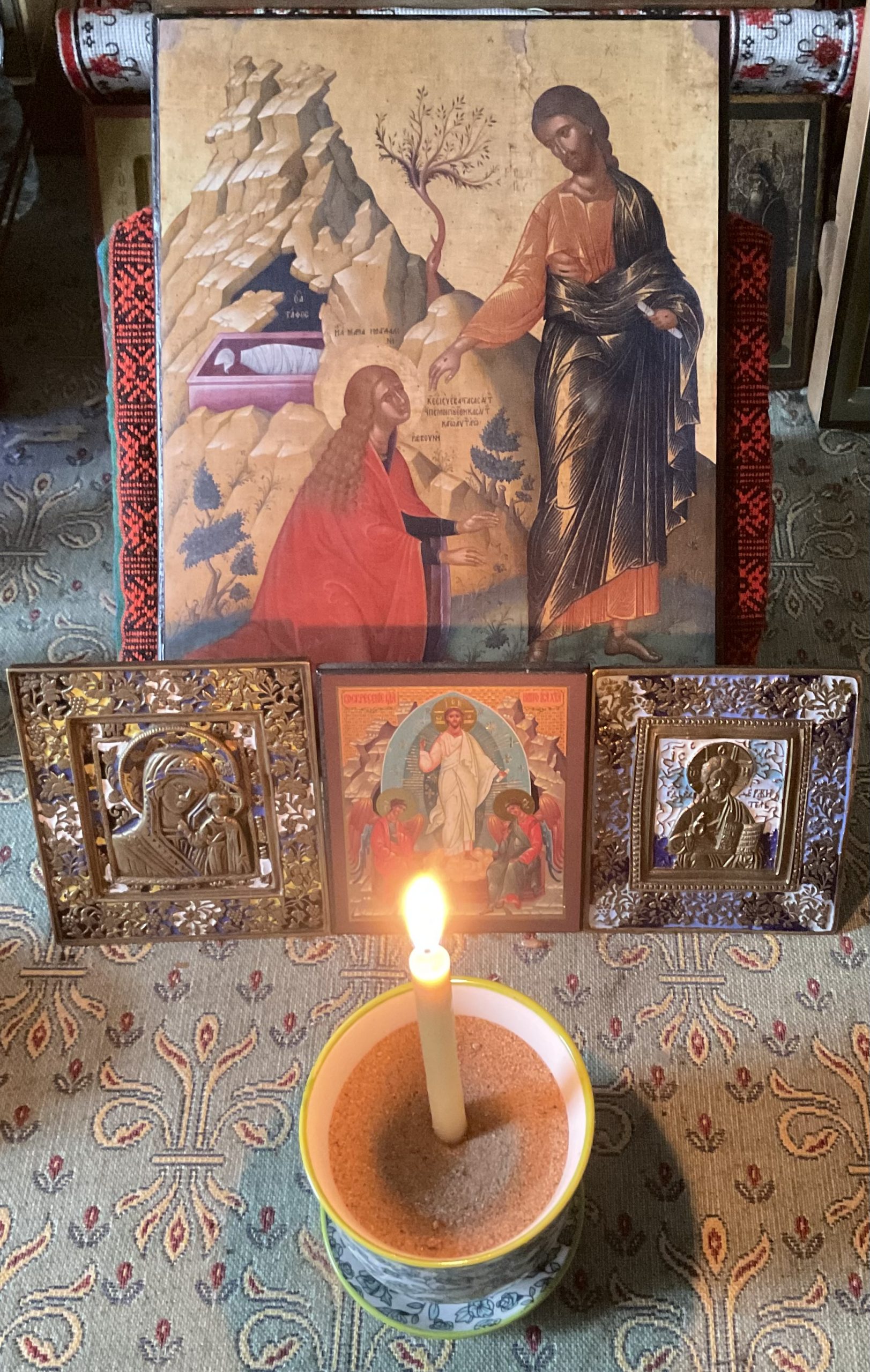



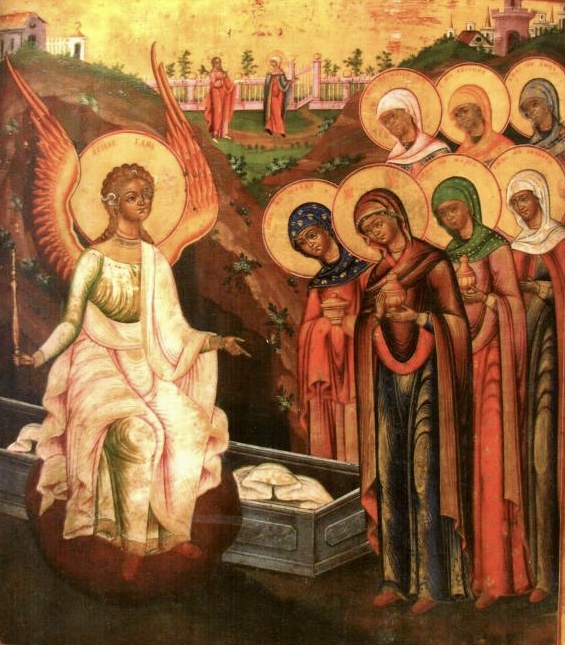
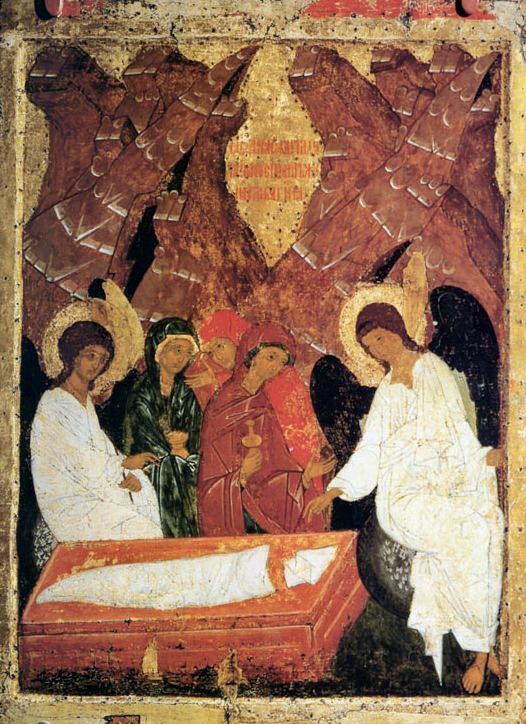 They had every excuse to be confused, fearful, anxious, enveloped in mental, spiritual darkness, but what of us, who have just celebrated the Saviour’s Victory over hell and death?
They had every excuse to be confused, fearful, anxious, enveloped in mental, spiritual darkness, but what of us, who have just celebrated the Saviour’s Victory over hell and death?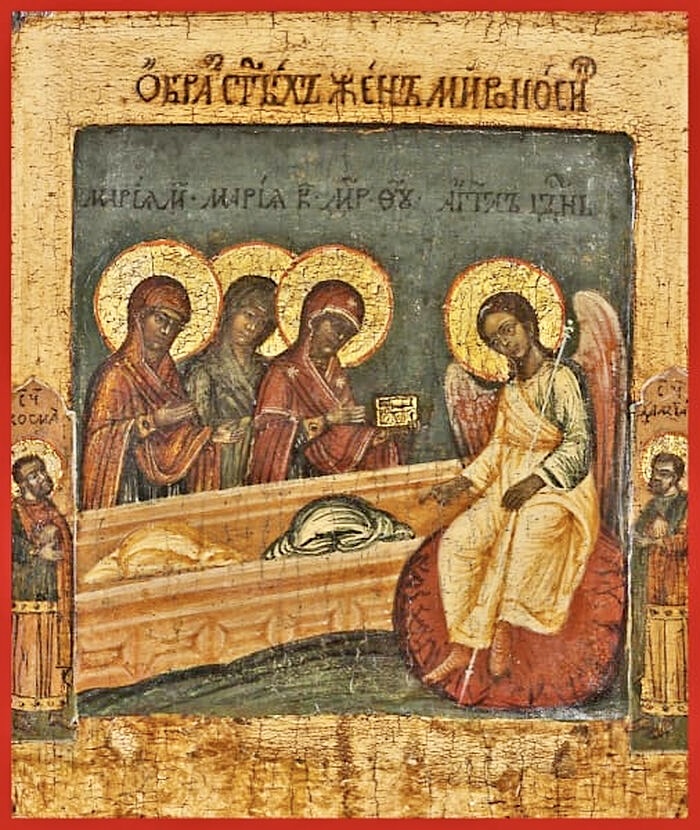
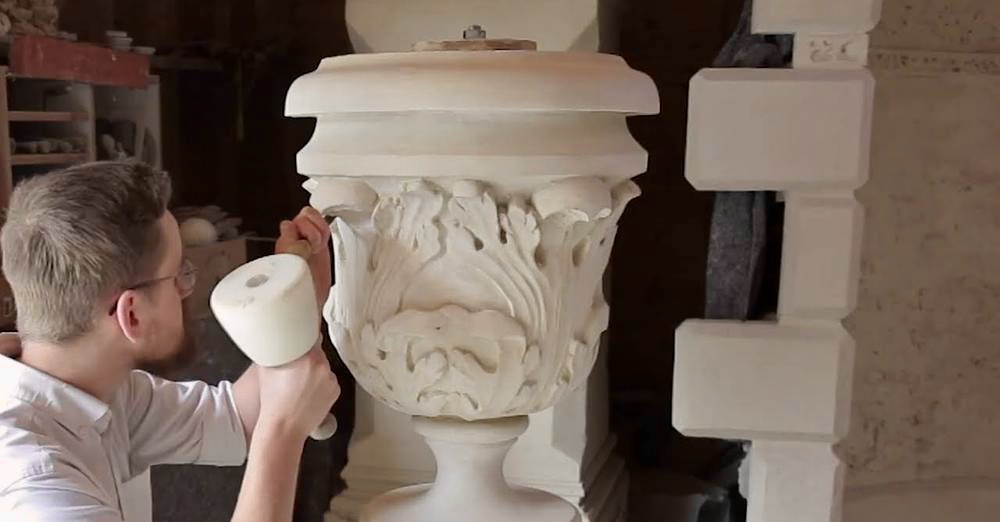
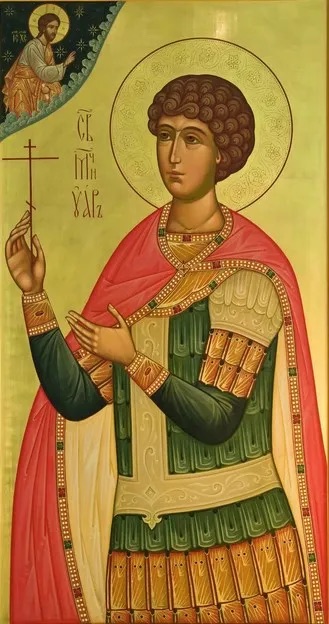 It happened that there were seven teachers of the Christians, desert-dwellers, that were brought before the Prince of Egypt.
It happened that there were seven teachers of the Christians, desert-dwellers, that were brought before the Prince of Egypt.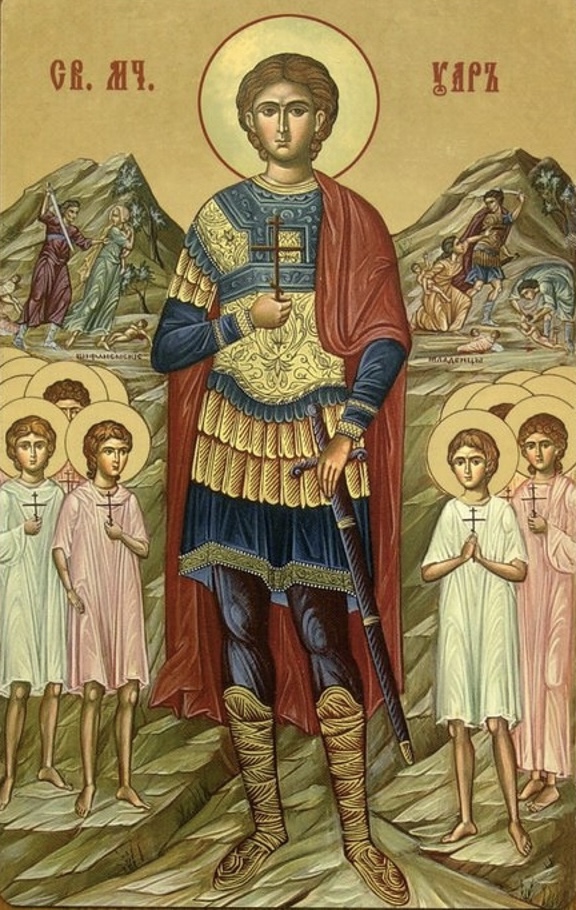
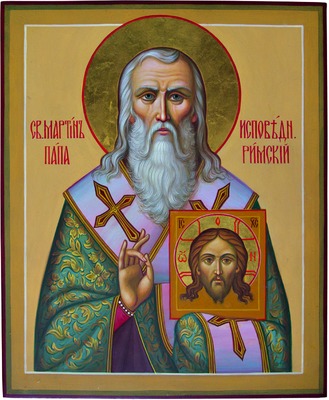 At this time the peace of the Church was disturbed by the Monothelite heresy (the false doctrine that in Christ there is only one will. He has a divine, and a human will). The endless disputes of the Monothelites with the Orthodox took place in all levels of the population. Even the emperor Constans (641-668) and Patriarch Paul of Constantinople (641-654) were adherents of the Monothelite heresy. The emperor Constans II published the heretical “Pattern of Faith” (Typos), obligatory for all the population. In it all further disputes were forbidden.
At this time the peace of the Church was disturbed by the Monothelite heresy (the false doctrine that in Christ there is only one will. He has a divine, and a human will). The endless disputes of the Monothelites with the Orthodox took place in all levels of the population. Even the emperor Constans (641-668) and Patriarch Paul of Constantinople (641-654) were adherents of the Monothelite heresy. The emperor Constans II published the heretical “Pattern of Faith” (Typos), obligatory for all the population. In it all further disputes were forbidden.